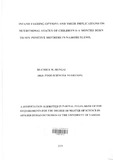| dc.description.abstract | Children born to HIV positive mothers are at risk of infection by the virus during pregnancy,
delivery and! or breastfeeding. Without any intervention, the risk of infection to the infants is
about 15% through breastfeeding. In addition, infants born without the virus might have
compromised nutritional status due -to inadequate maternal energy intake resulting from
increased needs from HIV. Therefore, such children require proper feeding to improve their
health. The recommended feeding practices for infants born to HIV positive mothers is
exclusive breastfeeding for the first six months of life, or exclusive replacement feeding with a
diet that provides all the nutrients an infant needs during the first six months of life. The
objective of this study was to determine the implications of feeding options used by HIV positive
mothers in Nairobi slums on nutritional status of their infants (0-6 months old).
A cross sectional study was carried out in Mathare and Korogocho slums in Nairobi during the
months of July to October 2007. This was a Health facility/ HIV support centre based study
involving 175 HIV positive mothers and their infants aged 0-6 months. Using a pre-tested
structured questionnaire and focus group discussions, data were collected on socio-economic and
demographic characteristics of the mothers, feeding practices and feeding options, immunization
and morbidity status of the infants. Anthropometric measurements of all the infants were taken
for nutritional status assessment, while a 24-hr dietary intake recall method was employed on a
randomly selected sub-sample of thirty two infants. Data management, entry and analysis was
done using SPSS version 12, Microsoft Excel and Epi-info Version 6.
The study identified three feeding option, exclusive breastfeeding, and replacement feeding and
mixed feeding employed by the HIV positive mothers. Those practising exclusive replacement
feeding, used infant formula (60%), cow milk (11%), and porridge (7.2%), puree (mashed ripe
fruits or cooked vegetables) (3.3%) and combination of two or more of the above foods (18.5%).
The high percentage of mothers using infant formula was due to availability of the formula
through donations. The mothers practising exclusive breastfeeding were mainly those who had
no access to donated infant formula and could not afford replacement foods. Others practised
exclusive breastfeeding feeding to avoid stigma. Those practising mixed feeding did it due to
social pressure to breastfeed or to avoid stigma.
Majority of the infants (64.6%) had normal weight for age, 24.6% were between mild and
moderate underweight while 10.8% were between mild and moderate over weight. Most of the
infants who were moderately underweight were on mixed feeding, while infants on exclusive
breastfeeding had higher cases of mild underweight compared to those on replacement feeding.
All cases of overweight were associated with exclusive replacement feeding. The type of feeding
option employed by the mothers contributed significantly (P= 0.003) to the nutritional status of
the infants.
Majority of infants on replacement feeding had adequate daily intake of protein (84.4%),
vitamin (81.3 %), iron (65.6%) and energy (62.5%).The energy intake among underweight
infants was significantly lower (p=O.009) than that of infants with normal weight.
The study concludes that exclusive replacement feeding is the most commonly used feeding
option among HIV positive mothers in Nairobi slums due to convenience and accessibility
through donated infant formula .Infants on replacement feeding have better nutritional status
compared to those on exclusive breastfeeding and mixed feeding. However, there is tendency for
infants on replacement feeding option to be obese. Therefore, choice of feeding option
determines the nutritional status of the infants. However, reliance on donated infant formula
among mothers choosing exclusive replacement feeding is not sustainable hence the study
recommends a national wide inclusion measures to improve social economic status of the
mothers from resource limited settings and access to low cost replacement infant feed. These
should also include stepping up of efforts by the government and Non-government bodies to
improve sanitation and access to clean water for safe replacement feeding. | en |

